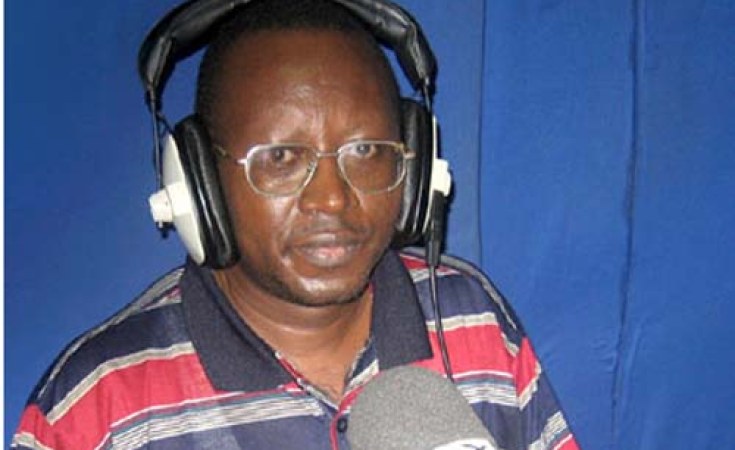The lifeless body of Floribert Chebeya Bahizire was found in the back seat of his car on June 2 in a neighborhood not far from his home in Kinshasa, the capital of the Democratic Republic of the Congo. When he was last heard from, Floribert was on his way to meet the Inspector General of Police, John Numbi, known for his corruption and power; but otherwise the circumstances of Floribert's death are both unclear and suspicious. His loyal chauffeur, Fidele Bazan Edadi, is still missing.
Floribert was undoubtedly Congo's most prominent, committed, courageous human rights activist. From his early years when he won the Reebok Human Rights awards in 1992 for fighting the Mobutu dictatorship, through the national conference process, the civil war, the Laurent Kabila regime, the Congolese elections, and the current deteriorating dispensation – Floribert persevered, finally paying the ultimate price for his vision of a free and democratic Congo. He should be remembered as one of Congo's greatest freedom fighters, a leader of Africa's democratic movement, and an international human rights giant. His murder is an enormous outrage.
I first met Floribert about 20 years ago when he was visiting the U.S.; shortly thereafter, the National Endowment for Democracy (NED) made its first grant to the organization he led, La Voix des Sans Voix, in 1991 for U.S.$31,289, "to support the VSV's efforts to increase the understanding of and commitment to human rights and democracy in Zaire through a civic education program that includes a monthly bulletin, audiovisual materials, and public meetings." It was the first grant NED made in Zaire, and there can be no question that Floribert paved the way and set the standard for all that followed.
Floribert was both gentle and fierce. His small stature, soft voice, thick glasses and warm smile belied the toughness and determination that landed him in and out of detention on multiple occasions, and that elevated him to be the widely acknowledged leader of Congo's human rights movement in several networks such as Droits de l'Homme Maintentant, and mentor to scores of human rights NGOs across the country. When the pressure and threats became too great, Floribert would send his wife and children across the river to Brazzaville, but he stayed behind in Kinshasa to continue his work. His family had to move from time to time for security reasons, but the occasions when I was honored to have dinner at his home were filled with the love and warmth of his devoted wife and children. When he spoke before mass audiences his eloquence and passion were captivating, but unlike so many other tribunes of the people, his integrity was incorruptible, he never lost his connection with the Congolese people whose voice he had become. I sat with him once as he interviewed an alleged recent victim of human rights abuse. He was delicate, yet probing, and rather than rushing to judgment, determined that her case was doubtful; promising to follow up with her later. He and the staff of VSV investigated and sought redress for hundreds of such cases.
Floribert was a realist. He understood politics, but never sacrificed principles. He was as unafraid to criticize American policies as those of his own government. When most other Congolese, including some human rights advocates, were denouncing the Tutsis and Banyamulenge after the Rwandan invasion, Floribert defended the rights of innocent civilians who were targets of human rights abuse no matter what their ethnicity. He had enormous energy. Leading a committed team, Voix de Sans Voix has issued hundreds of press statements over the years, meticulously documenting human rights abuses and denouncing them. VSV has likewise held hundreds of workshops, training conferences, civic education events, and campaigns. Floribert undoubtedly inspired hundreds of activists throughout the country who still cite VSV for getting them off the ground, showing them how to do human rights work, and counseling them on strategy. He distributed his Reebok Human Rights Award among other civil society organizations rather than keeping it for himself or even his own organization. His impact on the human rights movement and the understanding and appreciation for democracy in Congo was profound.
Whether or not the gunman or the person who gave the orders is ever identified, we know who killed Floribert Chebeya. The Congolese political system has become increasingly repressive, human rights organizations are continually threatened, journalists have been murdered, the political opposition emasculated, and the rule of law flouted. In the east the vicious killings, looting, and mass rapes committed by the Congolese army continue unabated. The UN peacekeepers are being pressed to leave, and the prospects for any democratic elections in the future are fading. The Congolese people have lost one of their most ardent defenders. Floribert will be remembered among the pantheon of African martyrs and freedom fighters such as Patrice Lumumba, Steve Biko, and Tom Mboya. But those who committed this crime will not go unpunished. Floribert's death will not be in vain. This time, the torturers have gone too far, and the local and international furor over their act is already shaking the regime; Numbi has been suspended pending an investigation. And Floribert's many friends will not allow his vision of a free and democratic Congo to die. He would have demanded no less.
Dave Peterson is director of the National Endowment for Democracy's African Program. This article was originally published on 11 May 2011 on Save The Congo's website, and has been reprinted with the permission of the author.


